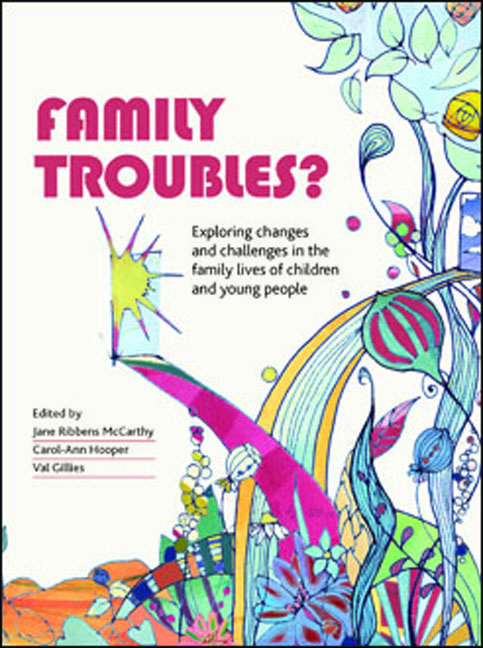Book contents
- Frontmatter
- Contents
- Notes on contributors
- Foreword
- Preface
- 1 Troubling normalities and normal family troubles: diversities, experiences and tensions
- Part One Approaching family troubles ? Contexts and methodologies :Introduction to Part One
- Part Two Whose trouble ? Conteste d definitions and practice: Introduction to Part Two
- Part Three The Normal, The Troubling And The Harmful?: Introduction to Part Three
- Part Four Troubles and transitions across space and culture: Introduction to Part Four
- Part Five Working With Families: Introduction to Part Five
- Index
1 - Troubling normalities and normal family troubles: diversities,experiences and tensions
Published online by Cambridge University Press: 07 September 2022
- Frontmatter
- Contents
- Notes on contributors
- Foreword
- Preface
- 1 Troubling normalities and normal family troubles: diversities, experiences and tensions
- Part One Approaching family troubles ? Contexts and methodologies :Introduction to Part One
- Part Two Whose trouble ? Conteste d definitions and practice: Introduction to Part Two
- Part Three The Normal, The Troubling And The Harmful?: Introduction to Part Three
- Part Four Troubles and transitions across space and culture: Introduction to Part Four
- Part Five Working With Families: Introduction to Part Five
- Index
Summary
Introduction
In setting out to explore changes and challenges in the family lives of children and young people, and whether and how it may be important, useful and productive to consider such experiences as troubling or troublesome, we started from some basic assumptions for framing our thinking across diverse topics and circumstances. The first is that change is an inescapable feature of life, and these changes will often be highly challenging, although in some circumstances, it may be the absence of change that is troubling. The second is that troubles, conflict and painful experiences are common features of children's and young people's lives as these occur in the particular contexts of their families and close relationships, and all families are likely to be troubled at times. Yet, an idealised notion of childhood as a time of protection and innocence in contemporary Western cultures sometimes undermines the ability to acknowledge this and to equip children to deal with such trouble when they encounter it, and this failure may itself exacerbate the impact of trouble. This raises a significant tension between how far to understand troubles as pervasive and, indeed, universal and to build expectations of and for children's lives on this basis, and how far to see troubles as avoidable and unacceptable and requiring clear interventions that will state this unequivocally, and seek to remedy and/or prevent such troubles.
A further tension concerns how to understand and prioritise children's needs in the context of their family relationships. Recent decades in affluent Western societies have seen a dramatic shift in public policy and popular media towards the nature of parenting and the ‘skills’ needed to perform it satisfactorily, promoting what has been described as ‘intensive mothering’ (Hays, 1996) and ‘concerted cultivation’ (Lareau, 2003). The demanding nature of such parenting in terms of parents’ (generally mothers’) time and devoted attention, and the increased expectations of parenting skills, has occurred amidst a process of increased surveillance and regulation of parents (Burman, 2007) and moral discourses that have led to a ‘responsibilisation’ of parents (Ribbens McCarthy, 2008). The belief that changes in parenting will rectify many, if not most, societal problems is proffered at the expense of attention to the impacts of poverty and inequality on the challenges of parenting.
- Type
- Chapter
- Information
- Family Troubles?Exploring Changes and Challenges in the Family Lives of Children and Young People, pp. 1 - 22Publisher: Bristol University PressPrint publication year: 2013



